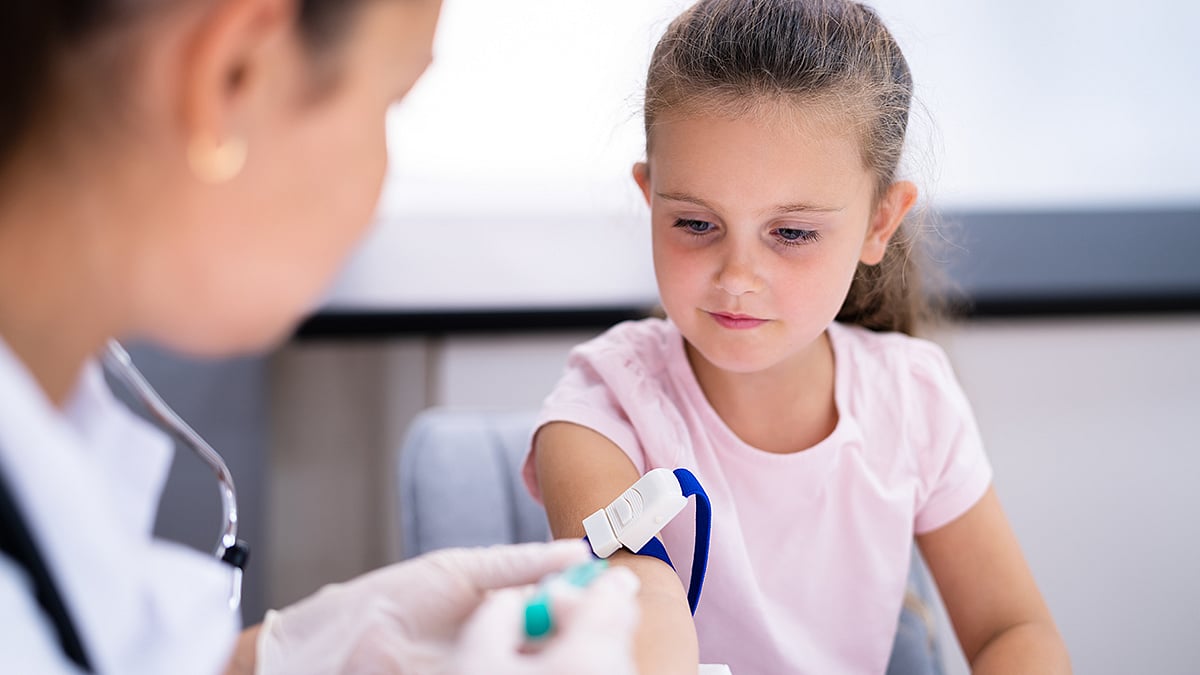Get Healthy!

- Dennis Thompson
- Posted January 7, 2025
Blood Test May Help Predict How Long Immunity Lasts
It’s long been a mystery why folks need a flu vaccine every year, even though immunizations they got in childhood continue to protect them from measles and mumps.
Researchers now think they know why vaccine effectiveness varies -- and they’ve even come up with a blood test to check a vaccine’s durability.
“Our study defines a molecular signature in the blood, induced within a few days of vaccination, that predicts the durability of vaccine responses and provides insights into the fundamental mechanisms underlying vaccine durability,” senior researcher Bali Pulendran, a professor of microbiology and immunology with Stanford Medicine, said in a news release from the college.
This test could be used to create individualized vaccine plans for people, predicting when some will need a booster sooner than others, researchers said.
Why some vaccines coax the body to produce antibodies for decades while others last mere months “has been one of the great mysteries in vaccine science,” Pulendran said.
It turns out that vaccine durability has much to do with a type of blood cell called megakaryocytes, which are typically implicated in blood clotting, according to results published Jan. 2 in the journal Nature Immunology.
For the study, researchers followed 50 people who received an experimental H5N1 bird flu vaccine.
Patients were randomly assigned to either receive the vaccine alone, or in combination with an adjuvant -- a chemical mixture that enhances the immune response to a vaccine.
Blood samples collected at a dozen time points during the first 100 days after vaccination took stock of all the genes, proteins and antibodies at work during each person’s immune response.
Researchers found a pattern in the blood samples associated with the strength of a person’s antibody response months after their vaccination.
This pattern was mostly reflected in genetic material contained in their platelets -- the small cells that form clots in blood.
Platelets are formed from megakaryocytes found in the bone marrow, researchers said. They enter the bloodstream by breaking off from megakaryocytes, and thus carry some of the genetic information contained within the larger cells.
“What we learned was that the platelets are a bellwether for what is happening with megakaryocytes in the bone marrow,” Pulendran said.
To verify that megakaryocytes had something to do with vaccine durability, researchers gave laboratory mice the bird flu vaccine along with thrombopoetin. That drug boosts the number of activated megakaryocytes in the bone marrow.
It turned out that thrombopoetin led to a sixfold increase in levels of anti-bird flu antibodies within two months, researchers said.
Further experiments revealed that megakaryocytes produce biochemicals that increase the survival of the bone marrow cells responsible for making antibodies.
“Our hypothesis is that megakaryocytes are providing this nurturing, pro-survival environment in the bone marrow for plasma (immune) cells,” Pulendran said.
To see if this held true for other types of vaccines, researchers looked at previously collected data on nearly 250 people given seven different vaccines, including those for the seasonal flu, yellow fever, malaria and COVID-19.
The same signs of megakaryocyte activation were associated with longer-lasting antibody production for all seven vaccines, researchers found.
In essence, the signature could predict which vaccines lasted longer, as well as which people would have a longer-lasting response.
“The predictive power of the platelet-associated signature appeared to hold true across a diverse range of vaccines, suggestive of the existence of a conserved mechanism underlying vaccine durability,” Dr. Petter Brodin, a pediatrician with the Karolinska Institute in Sweden, wrote in an editorial accompanying the new study.
“This raises the tantalizing prospect of developing a practical tool for predicting the longevity of immune responses during vaccine development and clinical trials,” Brodin continued.
The research team plans to conduct further studies aimed at figuring out why some vaccines spur higher levels of megakaryocyte activation. Such knowledge could aid the development of more powerful and durable vaccines.
They also want to develop tests for how long a vaccine is likely to last, which could lead to personalized vaccine plans for every person.
“We could develop a simple PCR assay -- a vaccine chip -- that measures gene expression levels in the blood just a few days after someone is vaccinated,” Pulendran said. “This could help us identify who may need a booster and when.”
More information
The Centers for Disease Control and Prevention (CDC) has more on how vaccines work.
SOURCE: Stanford University, news release, Jan. 2, 2025








